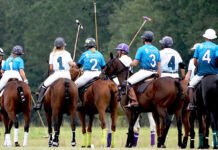Fall in Point Clear is like a party that is over, cleaned up and waiting until summer again. The air is quiet and cool. The east breeze keeps the Bay calm and smooth, and doves coo in the trees and flutter about the yard. Schools of mullet ripple past the end of the docks, and speckled trout thrash the baitfish under seagulls not far offshore. Our Stauter boats are out of the cable lifts, turned over in the backyard on sawhorses. We’ll fill the nicks with Bondo, sand them, then refinish the wood with Jack Tar paint. Now hunting season is on our minds.
Even though there are hundreds of acres of woods across the highway from our house, I don’t recall any real hunting going on in Point Clear. Back in the ’70s and ’80s you might could shoot skeet off the end of the wharf without worrying about a call to the sheriff. You could even fire off a few rounds from your new high-powered deer rifle and imagine the bullet landing somewhere out in that empty Bay, maybe near Middle Bay Lighthouse. That was about it. In 40-plus years I’ve never even seen a deer around. But there was hunting before my time. Dad told me that his first test as my mother’s suitor was standing in a pair of waders with a shotgun out near Zundel’s pilings while my maternal grandfather ran his Stauter in circles stirring up the ducks. The waders leaked, and the Bay was icy cold. He didn’t get any ducks, but he passed the test.
So here we were, years later, a resulting family of nine planning for Thanksgiving dinner. The meal was quite a production in our household. But an even bigger production was getting back from the deer hunting camp in time to make it. My brothers and I always had to squeeze in that last morning hunt and hurry home.
One afternoon we were about to start without my brother, Reid, when I heard his tires crunching the gravel in the driveway. I met him outside as he stepped out of the old secondhand Cadillac my grandfather had recently sent to him. It still had the Texas plate on it.
“You get anything?” I asked.
“Yeah, ” he said, hesitantly. “I got one. Big six point. I shot it yesterday and didn’t find it until this morning. That’s why I’m so late.”
“Where is it?”
“In the trunk.”
“In the trunk?”
“Yeah. Come look at it.”
I followed Reid around the car. He popped the trunk, and I saw the buck lying on a blue tarp with ice bags stacked around him. I studied the scene briefly before the foul smell drifted over me.
I backed away. “That thing smells awful, Reid!”
“Yeah, ” he said. “I wanted to ask you about that. You think it’s still good?”
“No.”
“I couldn’t even play the radio because it pumped the smell out of the back speakers.”
“It’s definitely bad.”
“I didn’t just wanna leave it. I shot it and all.”
“You need to get rid of it before it ruins the car.”
“What do I do with it? I can’t just put a whole deer in the trash can.”
“I don’t know … I guess you can dump it off the Fish River bridge.”
“Good idea, ” Reid said. “Is that even legal?”
“I don’t know why it’s any different than leaving it in the woods.”
“Yeah. Good point.”
“Or a dead fish.”
“Yeah.”
“Shut the trunk so Dad doesn’t see it, and take it after lunch.”
After our Thanksgiving meal, Reid hurried off to dispose of the deer. He drove out to the Fish River bridge and attempted to stop in the middle a few times before he realized there were too many passing cars to give him time to drag the body over the guardrail unnoticed. Then he had another idea. He recalled that not far away was a wooded lot my father owned on the river: One of the last undeveloped pieces in the middle of new riverfront housing development. He reasoned he could park in the woods and drag the deer down to the water without making a big production of it.
Reid bulled the Cadillac through an overgrown trail until it petered out not far from the riverbank. After much effort he managed to pull the deer out of the trunk, drag it through the brush, and shove it into the river. Then he returned to the car, leaned against it, and rested.
“Excuse me, ” he heard someone say.
In his exhaustion Reid hadn’t noticed that two men had approached from the house next door.
“Hey, ” Reid responded nervously.
They studied the blood on Reid’s hands and clothes. The open trunk with the bloody blue tarp and rifle lying next to the spare tire. The blood swipes down the chrome bumper. The Texas tag. The blood and flattened grass leading away toward the river.
“What’s going on back here?” they asked suspiciously.
Reid recontemplated the legality of dumping a dead deer. “Nothing, ” he said.
“What’s your name?”
“Reid Key.”
“Where you from?”
“Point Clear.”
The strangers glanced at the tag again and hurried away.
I don’t recall much real hunting going on at Fish River either.
text by watt key





